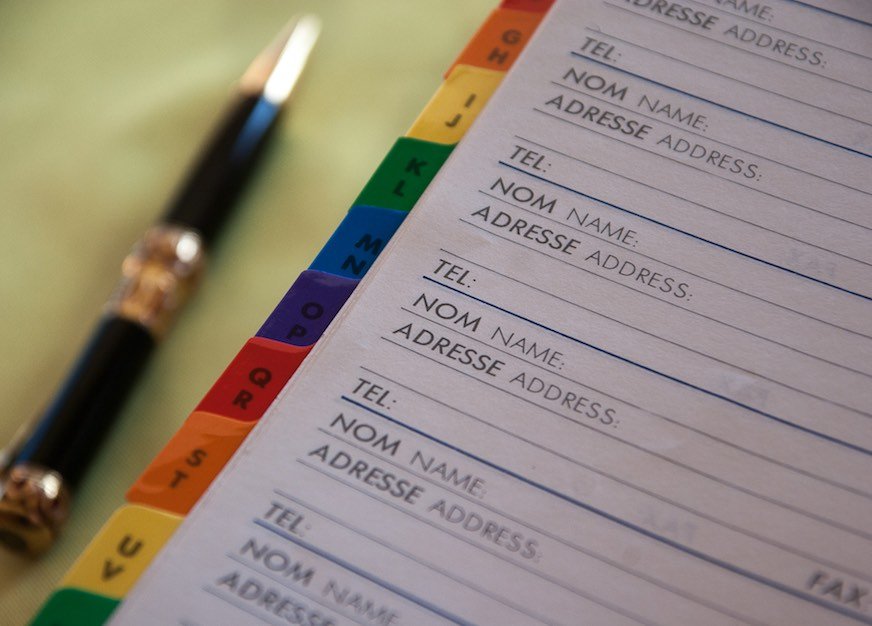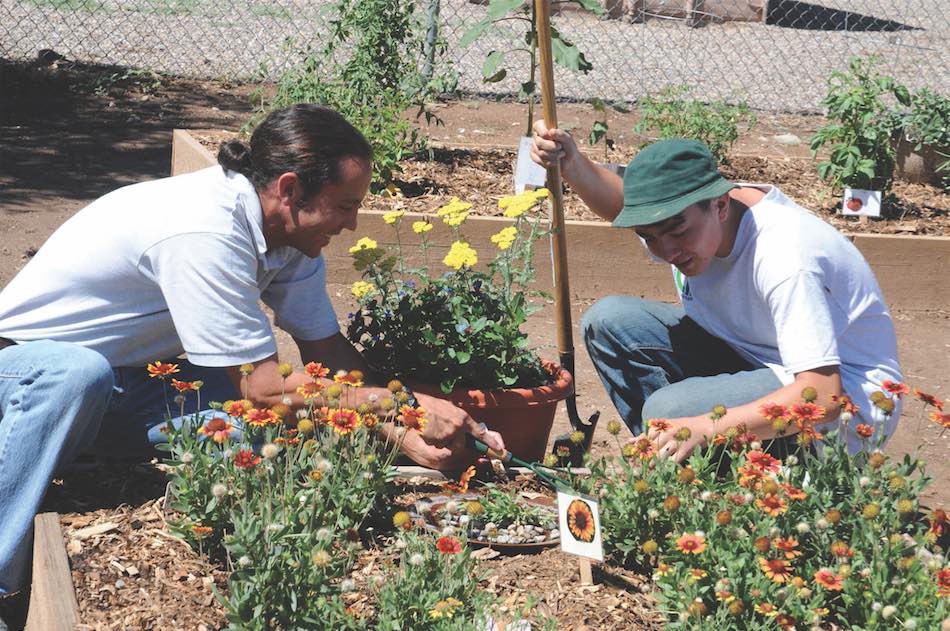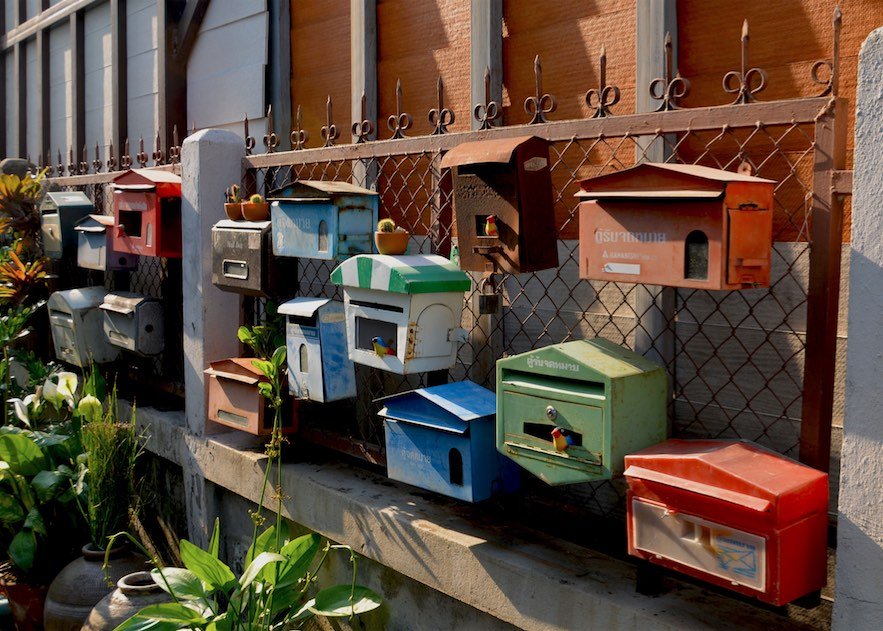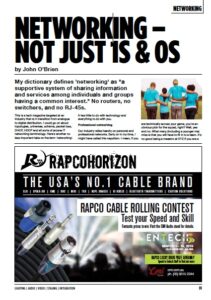News
25 Mar 2019
Networking – Not Just 1s & 0s

Subscribe to CX E-News
NETWORKING
Networking – Not Just 1s & 0s
by John O’Brien.
My dictionary defines ‘networking’ as “a supportive system of sharing information and services among individuals and groups having a common interest.” No routers, no switchers, and no RJ-45s.
This is a tech magazine targeted at an industry that is in transition from analogue to digital distribution. I could go on about topologies, universes, schema, packet loss, DHCP, HDCP and all sorts of arcane IT networking terminology.
Here’s another no less important take on the term ‘networking’. It has little to do with technology and everything to do with you.
Professional networking
Our industry relies heavily on personal and professional networks. Early on in my time, I might have called this nepotism. I mean, if you are technically across your game, you’re an obvious pick for the squad, right? Well, yes and no. What many (including a younger me) miss is that you will have to fit in to a team.
It’s no good being a maestro at XYZ if you are a problem to work with.
 As the age old maxim goes – there’s no ‘I’ in ‘team’. Finding a gig is not that easy. While various outlets do have job boards like CX, many other (particularly casual) jobs are not advertised so readily. It can sometimes come down to knowing the right people and being in the loop with them when the decisions are being made. Trotting out another well used meme – ‘It’s not what you know but who you know.’ Not very egalitarian but very real in business.
As the age old maxim goes – there’s no ‘I’ in ‘team’. Finding a gig is not that easy. While various outlets do have job boards like CX, many other (particularly casual) jobs are not advertised so readily. It can sometimes come down to knowing the right people and being in the loop with them when the decisions are being made. Trotting out another well used meme – ‘It’s not what you know but who you know.’ Not very egalitarian but very real in business.
For live work, you can be only as good as your last show. Without a strong network you’re reliant on reputation alone and consistent mis-steps will be noted. This industry is also relatively small – make a big mistake and everyone knows about it pretty soon. Now that we are all online 24-7, have an off night on camera and it can quickly go very publicly viral.
Industry and advocacy bodies like ALIA, AES, Music Australia, CEDIA, AVIXA / Infocomm, AETM (and the list goes on) are great networking opportunities for those well established in their field and a good place for newer members to start alliances.
You don’t need to be a member of the Davos Forum to make mutually profitable connections.
Social networks – online
Social media – always on, instantly connected, FOMO, fake news – a fully digital life has both benefits and pitfalls. Worldwide connectivity, real time news and information, bonding over common interests, finding assistance – all too easy when it’s just a click away.
Online communities can be a force for social change outside more traditional avenues too. Look to the Arab Spring or France’s recent Gilets Jaunes movements as examples. These and more are beneficial reasons to click the ‘sign me up’ button.
The main cost of this Faustian pact is your privacy – easily given, very hard to retract. Don’t forget that your social convenience is often being mined by mega corporations for saleable data. These platforms are now so pervasive that it is difficult to not join in. I have relented and joined LinkedIn. It’s allowed me to stay in contact with old colleagues, especially in an industry where people move about a fair bit.
I’ve been headhunted a couple of times from this service but also stalked by an ex and I really don’t know where my data has ended up. Pros and cons folks…
However, I already have enough online interaction in my life to not fill my screen with any other social media feeds. I accept that this choice is rare in these times and it does come with the penalty of missing out on much information like births, deaths, marriages, etc. For me, a more personal touch more than outweighs the negatives of this approach.
Social networks – offline
I now live in a small country hamlet and the value of social connection is amplified here. Help can take a long time to arrive when you need it and you learn to lean on the neighbours (and them on you).
Once, information passed slowly over the back fence or at Sunday gatherings. The advent of telephony brought the phone tree, where each person spread the message on and out. Now I administer an email list group that acts as our bush telegraph. It covers a large percentage of local residents and regular visitors, gets to everyone in real time and lets us share goings on without the pitfalls of Chinese whispers. It’s taken some careful moderation at times but is very successful as a community building tool.
Another personal rural example is the CFA – a state-wide network of volunteers who band together to help each other out when fire and other emergencies threaten. My partner and I are active members and, as I type, have spent four of the last five days fighting and cleaning up a nasty 64Ha fire that started 600m from our doorstep. It’s hot, scary and dangerous but the network provides equipment, training, and bands everyone together for a common goal.
It was especially gratifying to see CFA members from surrounding districts dropping everything and risking their lives to save our locale. We’ve done it for them before and will do so again. The bonds forged in such a network are strong.
Churches and religious groupings of all persuasions are prime examples of community networks seeking a shared purpose. Well-established groups such as Lions, Rotary, CWA and so many more are also similar in forging relationships that work towards the same end. Community gardens, men’s sheds, book clubs, knitting circles, maker labs, co-working spaces – all give a sense of comraderie and inclusion that is not so apparent with online groups.

Meeting someone from ‘the network’ on the street can give a deep sense of belonging to something greater
Having this link over one issue also strengthens the bond outside the immediate group interest. Meeting someone from ‘the network’ on the street can give a deep sense of belonging to something greater.
Maintaining the network Social capital is somewhat stronger when you see or correspond with these people on a regular basis. Just as our technology and tools need maintenance, so do our networks. If you regularly contact people from your list, however you do it, you’ll keep the links alive.
I make a point of calling someone different from either my personal or professional networks every week, just to say Hi. I may not have any type of current business with them but keeping the connection alive keeps me in their minds, so if any relevant work or social opportunities do arise, I’ll the first person they go to.
A little effort to make a call to or visit a real-world friend can bring untold reward beyond getting your tweet count up and the ‘likes’ are so much more real.
Try it some time. Right about now, many of you will be attending ENTECH. Yeh, you’ll be checking out some cool gear but I’ll bet you’ll also be catching up with colleagues, clients and suppliers. Guess what – you’ll be *networking*.
From CX Magazine – March 2019 CX Magazine is Australia and New Zealand’s only publication dedicated to entertainment technology news and issues – available in print and online. Read all editions for free or search our archive www.cxnetwork.com.au
© CX Media
Subscribe
Published monthly since 1991, our famous AV industry magazine is free for download or pay for print. Subscribers also receive CX News, our free weekly email with the latest industry news and jobs.








